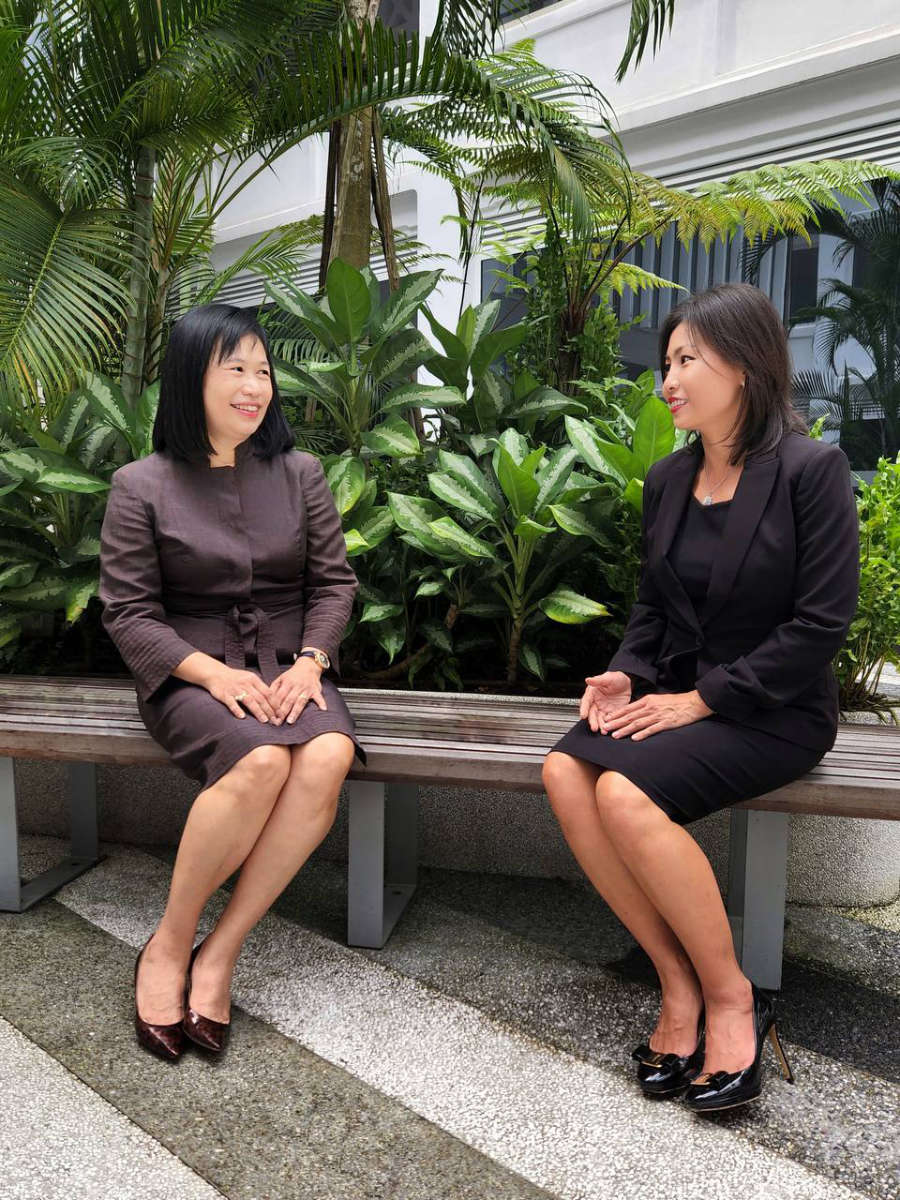
“Voices of the Women in the Industry” – Women in Litigation
The Law Society’s Women in Practice Committee is thrilled to present its inaugural “Voices of the Women in the Industry” article series that aims to gather exclusive industry insight from inspirational women in law. Each month, our article series will draw from the perspectives of women in different areas of the legal industry with a core focus on encouraging meaningful dialogue within the legal industry. Our first issue addresses sustainability in legal practice for women in litigation. We are glad to share a stimulating conversation between the newly appointed Senior Counsel Ms Marina Chin Li Yuen and Ms Koh Swee Yen below.

Senior Counsel Marina Chin (left) and Senior Counsel Koh Swee Yen
Ms Marina Chin Li Yuen (“MC”) is the joint managing partner at Tan Kok Quan Partnership and a working mother of three specialising in dispute resolution with over 30 years of experience. Ms Chin is a recipient of the Euromoney Legal Media Group Asia Women in Business Law Awards’ Best in Dispute Resolution award and has been consistently ranked as a recommended lawyer for dispute resolution by The Legal 500 Asia Pacific since 2017. She has also been recognised as a leading lawyer for Arbitration and Mediation as well as Litigation by The Best Lawyer.
Ms Koh Swee Yen (“KSY”) is a Partner in the Commercial & Corporate Disputes, and International Arbitration Practices at WongPartnership LLP. A working mother of one, Ms Koh is a trailblazer having been described as being “in a league of her own” by Chambers Global and the “go-to disputes lawyer in Singapore” by Legal 500. She is listed as one of the world’s leading arbitration practitioners in Who’s Who Legal: Arbitration 2022, and has a vast collection of accolades to her name, including her most recent award of Woman Lawyer of the Year (Law Firm) at the ALB SE Asia Law Awards 2021.
1. How did you decide that litigation practice was for you?
MC: Many moons ago (about 30 years’ worth of moons), “trainees” were referred to as “pupils”. As a pupil then, I was expected to spend two months in each of the three main departments: Real Estate, Corporate and Litigation. Tried as I might, I found it difficult to be interested in the first two departments. In contrast, the cut and thrust of litigation made me excited and alive – the strategizing outside the courtroom, and then marrying that with making persuasive arguments before a judge. I also realised that when it comes to cross-examination, I get an adrenaline rush like no other!
KSY: I am what many would term as an “accidental” lawyer. After college, my sister suggested that I should pursue a professional degree. I considered the available courses, and decided to apply for law school at the National University of Singapore. When I was in my second year of law school, I participated in the Australian Law Student Association Moot. Taking part in the competition was an eye-opener, and I realised I truly enjoyed the challenges and thrills of arguing a case and seeking to persuade the Judge of the merits of the case. I have not looked back since. After I graduated, I was privileged to have been able to clerk for the then Chief Justice of Singapore, Yong Pung How, and other judges of the Supreme Court. The dedication and contributions of the Judges to the development of law in Singapore motivated me to strive towards greater heights. After my stint, I decided to return to private practice with WongPartnership LLP to pursue my passion for advocacy, and work towards becoming a leading disputes lawyer.
2. KSY asks MC: Have you ever felt like giving up on legal practice?
MC: Fortunately for me, circumstances did not compel me to reach a point where such a difficult decision had to be made. Every job has its trade-offs, including the job of being homemaker. To have to give up legal practice would have been to give up what I found stimulating, and so the first option for me was always to try to balance the demands of practice and home.
3. What is sustainability in practice to you?
KSY: First, never stop learning. As a disputes lawyer, I make it a point to learn from each and every courtroom and arbitration experience. I will observe my opposing counsel, the witnesses, and the judge/tribunal to take home learning points. No matter how long you have been in the industry, there will always be fresh revelations.
Second, have resilience. It is important to never give up, and to always persevere. It may seem less daunting if you look at this as taking small steps to get to where you want to be. It is always good to remind yourself that you are in this career for a purpose, and to keep pushing yourself to become better at your craft.
MC: Legal practice is a marathon; it is not a sprint. In practice, you do have to pace yourself for the long distance – know when to take more measured steps and when to charge ahead. Otherwise, you may be running towards burn-out and collapse. It is also essential to recognise your own suitability in the practice. Both the work and the environment should be suitable. Without suitability, there will not be sustainability.
4. MC asks KSY: How do you balance the demands of legal practice and family life?
KSY: As the saying goes, work hard and play hard! I pride myself in working hard, but I also prioritise my family over work which keeps me grounded, and family time allows me to take my mind off work. To the extent possible, I make it a point not to miss out on important activities and events with my family. My child’s school actively involves the parents, so I would be at school trips, sports days, reading books to the students and cooking with them. This does mean that there is a need to work efficiently, multi-task and compartmentalise given that there are only 24 hours in a day.
5. KSY asks MC: Was there a moment in your career where you had to make a trade-off between a promotion/working on a major matter and being a caregiver for your child/children?
MC: It was more than one moment actually. There were years over which I chose to take a slower pace because of my children, but I don’t regret it at all. This was after I had my third child, and I was concerned that even quality time may not sufficiently make up for quantity, and so I took on a lesser workload at the office for the next few years. My three girls could not be more precious to me, but truth be told, I was never ready to give up practice altogether, and I don’t think I make the best stay-at-home mother anyway!
6. MC asks KSY: What are some tips to make legal practice sustainable for mothers with young children?
KSY: You need to have a strong support system. Whether this comes in the form of family, relatives, or a third party such as a helper. My mother has been assisting me with looking after my child on weekdays when my physical presence is required at work, and I have been fortunate to have her as my pillar of support.
It is also important to have a flexible work environment where the focus is on the work product and the outcome, and not on the particular time at which you are working. This allows one to manage time effectively, and take into account the child’s schedule without compromising on work productivity. The option of working from home is a great example of such flexibility!
7. MC asks KSY: Have your motivations or inspirations in legal practice changed over time?
KSY: Not really, I strive to become a better lawyer every day. I read legal updates and judgments from various jurisdictions daily. I would constantly reflect on cases that I have handled. I would mull over my written and oral submissions. When I read the transcripts of my cross-examination, I would consider how questions could be better phrased and whether there were questions which I should or should not have asked.
8. KSY asks MC: Why do female lawyers leave practice quite early on? How do you think we can encourage them to stay on?
MC: To my mind, reasons range from losing interest in legal practice to pressures on the family front. Perhaps as a start, it is important to ask the female lawyer what she has found appealing or compelling about practice. It is always good to have a timely reminder on these positive aspects, which may very well be key to changing her mind to stay on. Regardless of the reasons, understanding the “why” is key to how we can stem the loss of female talent. It is, after all, a loss for the person as much as it is for the profession if no attempt is made to address the problems she faces.
For instance, if the cause of leaving practice is to do with the office environment, perhaps she can seek a change in the same firm or move to a different firm for a more suitable environment. On the other hand, if the cause is specific to demands on the family front, then I believe that she should be encouraged to have a conversation with her spouse and family to allow her a fair chance to achieve the personal satisfaction she seeks in her career.
9. MC asks KSY: What are some of the ways you have protected your team members’ welfare in order to encourage them to have a sustainable practice?
KSY: I always tell them that they need to have a life outside of work, and it is important to make time for that. I would encourage them to clear their leave, and take time off to travel and spend time with their family and friends. I monitor their workload to ensure that they are not overworked. I advise them to rest and have early nights whenever possible. We have a flexible work environment, and we work very well as a team. Everyone is always prepared, without hesitation, to step in to help their teammate. We enjoy each other’s company as a team, and find time to socialise and have meals together. They also know that I am always there, and they are free to reach out to me if they wish to have a chat on any issue, whether personal or professional.
10. KSY asks MC: What are your thoughts about diversity in legal practice?
MC: I think that women have come a long way but more can be achieved by including a stronger community of female talents. This has to be dealt with on three different fronts:
First, society has to be more accepting of the mother working as hard as the father in the office (perhaps even harder!). This may also mean the father taking on more roles at home. I am heartened to see that there are more fathers choosing to do this.
Second, the office environment must be supportive and progressive. If there is an “insular boys’ club” within the firm, then I would encourage women to bring about awareness that such “boys’ clubs” reflect poorly on the organisation and its members, and to stand for the position that diversity is a win for all. The message need not be writ in fire and brimstone. Women can propose inclusive activities and also participate in what the men propose so as to reciprocate.
Finally, I encourage women to stand up for themselves. It is not just about what should be done to help break the glass ceilings, but also what should be done to get off the sticky floor. As compared to men, women are more likely to hold back from expressing their views and taking the lead. Whether it is innate and/or environmental, women should not assume status quo, underestimate what they are capable of and think that the best person for the job cannot be a woman.
11. Is there anything you think you would have done differently if you could turn back time?
KSY: Looking back, there have been moments in my life where I could have done better but I don’t think that I would do anything differently because I believe that each and every experience has shaped me into the person that I am today.
MC: Where I am today was actually not part of my original plan. The only plan I had was to remain in practice, and admittedly after I started taking a slower pace, I was content to let others run that much harder and even “overtake” me if they wished. However, I have been both compelled and blessed by circumstances to push myself beyond the comfort zone. Regardless, I would still have made the same choices, including taking the longer path to be where I am today.
The authors would like to thank Ms Arya Gerard for her assistance with the article.






